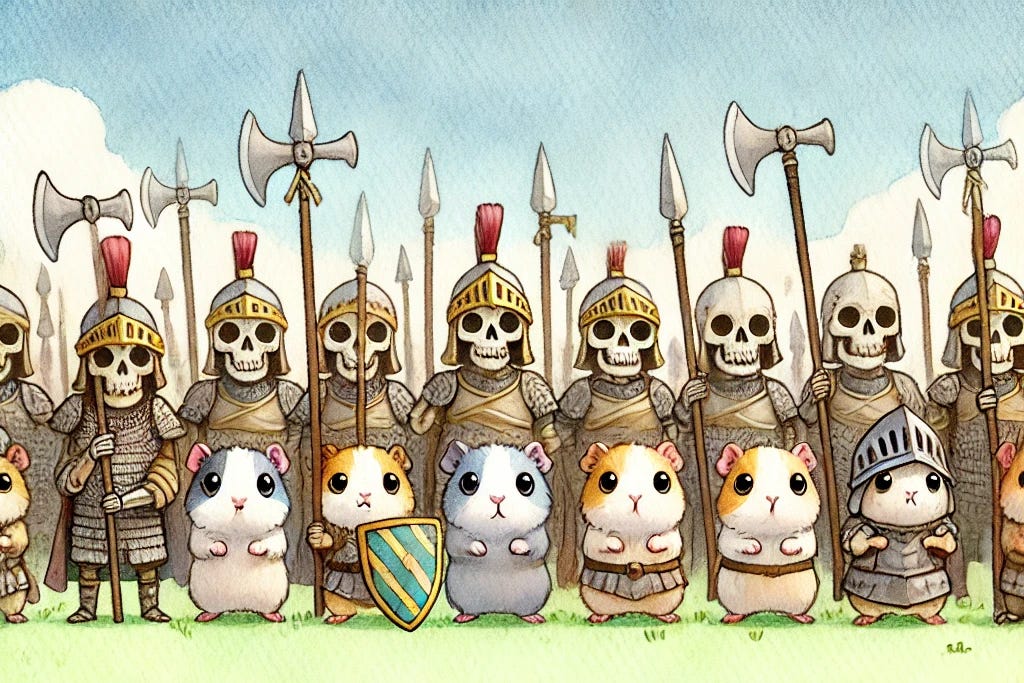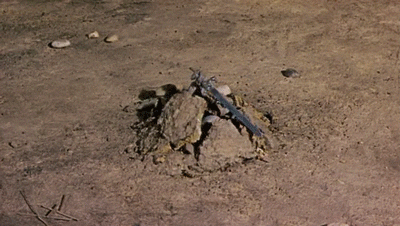Let’s talk about this skeleton army.1
Last week I posted the draft of the Kickstarter I’m planning to do for the book. (THANK YOU FOR THE EXCELLENT FEEDBACK. I’ll look forward to incorporating it.)
It mentioned a “skeleton army”. Here’s what I mean:
The “skeleton army” is my name for the select group of Egan-curious homeschoolers who’ll help refine the homeschooling curriculum I’ll write about in the book. For the first half of the 2024–25 school year, they’ll engage with the secret draft content I share, test the practices at home, and provide lots of feedback.
In exchange, they’ll get to see these practices a year early, and shape how they ultimately come out. The group will evolve from there.
Oh, I see someone has their hand up!
Imaginary Interlocutor: You looking for a lot of mildly-engaged people, or a few super-engaged people?
More toward the “super-engaged” side. That said, I don’t expect anyone to try out literally all of the practices. I do, however, hope that you’ll try out the ones that make sense for you, and give feedback on them.
I.I.: Do I need to be a homeschooler?
I don’t think so — it might be enough that you’re a parent who’s willing to try out some of these with your kids. That said, we want the majority of folks to be homeschoolers (it’ll make for a tighter community), so I might need to limit the number of non-homeschoolers at this juncture.
I.I.: What about the ages of my kids?
The book will officially be for kids in grades 1, 2, 3, and 4, but really, it’ll also be useful for older kids (even Egan’s younger-age curriculum packs an adult-level intellectual wallop), and there’ll be a lot of stuff that parents of preschoolers and kindergarteners can use. But like before, I want to make sure that the majority of folks in this early iteration have kids in the target age.
I.I.: My kid is 4 years old, and I don’t call myself a homeschooler. Am I a homeschooler?
For our purposes, yes you are.
I.I.: I am a valiant warrior on Facebook, courageously defending reason and goodness against the barbarians.
Good for you! This community probably isn’t a good choice for you, particularly in its early iterations. We’re going to have Reds and Blues (and Greens and Greys), and we’re going to have to wade into some value-laden questions. People are occasionally going to share that they’re hoping that their children will grow up to become people that you desperately want your own kids to be 180º different from, and you’re going to find yourself helping them do that.
Probably I’m exaggerating this! The point stands, though, that we’re going to be practicing the subtle art of conversing (and supporting each other) over ideological, religious, and cultural divides. If all your strengths lie in the opposite of that, this probably isn’t the best time to try to stretch yourself.
I.I.: I’d like to apply!
Great! Scroll to the very bottom of this post.
I.I.: Alas, I think I’m not able to join the army — but I’d still like to help.
I hope you can! Jump to “2. Into the unknown” below to find out. Right now, I’ll sketch out how I see this happening.
1. The plan
Phase 1: The crappy start
The immediate goal of all this, just as a reminder, is to help me write our first Egan homeschooling book. Very soon, I’ll turn my notes for that2 into a crappy Google doc that everyone in the army can see, and post questions about.
I.I.: Why this focus on asking questions?
I’m well-aware that, as a communicator, my biggest limit is that my brain is a mushy jumble of Gordian knots.3 I find it really hard to express ideas in ways that everyone can understand.
I’m hoping that writing direct answers to people’s pressing questions (about these practices) will show me how I need to write this for a mass audience.
I.I.: How crappy will the notes be?
Pretty crappy! But I want to get the nuts-and-bolts of the whole 20 chapters out at once, so people can ask pressing questions about practices they think might help their kids now.
Phase 2: The rough draft
Each week, I’ll turn the notes from one chapter into a rough draft, and then get the Army’s help in making notes about how it should be modified.
Every Friday, I’ll post a rough draft of a chapter. Each chapter covers one subject (e.g. “Geography” or “Life Science” or “Arithmetic”) and includes 3–5 practices. (Geography, for example, includes “Orient yourself”, “Memorize place names”, and “Read adventures”.)
I think that every Sunday I’ll do a quick meeting with Army members who can show up and ask questions — those who aren’t able to make it can just give feedback through the week. We’ll turn these into notes on what to add/tweak in the final draft.
As there are 20 chapters, this’ll take 20 weeks — which is five months, taking off two weeks for the holidays. It’ll go through mid-February. Crucially, the conversation for each chapter will stay open — so folks can keep adding their feedback as the months go on.
I.I.: What sort of feedback will you be looking for?
Practical stuff. “What the heck do you mean by…?” is great, as is “this is too danged complicated, I’m throwing in the towel.”
I want Army members to tell us how it’s going: “I tried this, and my ADHD kid couldn’t pay attention” is useful, as is “I tried this, and now my ADHD kid wants to become a microbiologist.”
Especially helpful will be people who can point the others toward great resources, especially because
I suck at this, and
like 40% of every homeschooling book is just lists of resources.
I.I.: What kinds of resources?
Good books, especially: homeschooling means building a library. YouTube videos, also. Websites, apps, and so on. Tricks for using AI (there’ll be a strong AI component to what we’re doing).
Phase 3: The good draft
When we’re done with that, I think we’ll invite more people in, and make some rough drafts good-er by incorporating our experiences. This’ll last from March to about June.
Last week I wrote:
Nothing truly wonderful can ever be engineered, it can only be evolved. For these practices to work smoothly, they need to have been tested, critiqued, and tweaked many times with many kids.
and dang it I think that’s true.
Egan’s greatest mistake, I think, was not investing in a solid foundation of research to back up his claims. Well, what we’re doing won’t be a careful objective study (those are hard to do in the most controlled situations — and this won’t well controlled), but it’ll still be something big: we’ll get a picture of how well/poorly this kid of homeschooling works, and we’ll continuously incorporate feedback to make it better. This is research, too, and it’ll make it easier to do more objective research later.
We’ll run the Kickstarter during this period, which will lead up to…
Phase 4: Publishing
And then, near the end of Summer 2025, I and my team will publish the book. It’ll be illustrated, have a nice cover, and be available on Amazon. It’ll be the evolution of everything we’ve done… and it’ll make it easy for anyone, anywhere, to do four years of Egan homeschooling.
I.I.: What becomes of the group after that?
Glad you asked…
2. Into the unknown! (sorry, it’s in my head too, now)
I said before that the immediate goal of all this is to help me write our first Egan homeschooling book. But the ultimate goal of that book is to make Egan education a live option for everyone who homeschools — and for that, we need more than a book. I think we need an online community.
This is a place for parents to go for help, support, or just to find their tribe. All the philosophies of homeschooling have online communities. And from my understanding, the reason that classical education (which I love) has been taking over the homeschooling world wasn’t so much Susan Wise Bauer’s classic book on the subject than the online forum (delightfully referred to as “the hive mind”) that she created to support the book.
So, ultimately, the goal is for the skeleton army to become the seed crystal of this wider online community. Will it work? Well, fingers crossed. One must try!
I.I.: How can I help?
Glad you asked! I need to make some big decisions on this rather quickly. Here are some of the questions I’m asking.
What platform?
Any recommendations on a platform we could use for all this?
I’m looking for something that’s…
good for tight community
easy for me (a relative technophobe) to run
easy for others (including relative technophobes) to join & use
useable on a phone
likely to be around in 15 years
has no ads
This means that Facebook is out (not tight), as is Discord (not easy for some others to join and use). Substack won’t work, because each newsletter has a specific author; we need something more democratic/polycentric. An old-fashioned BBS probably won’t, because I’d need to rent server space (a line too far for my ADHD brain).
At the moment I’m leaning toward either Mighty Networks or Circle. (They’re not free, but I’m happy to throw some money at this).
Do you have any experience with either? (I don’t.) Do you have another platform to recommend? Share in the comments!
But a beautiful online community doesn’t just need good hardware and software, it needs good “wetware” — squishy human minds need to work together.
What community norms?
Any recommendations on how to run a healthy community?
In order to prevent this from crashing and burning, we need a community that bridges folks who disagree about a lot, and occasionally brings their minds together to work on hard problems.
We don’t have time to re-invent the wheel. So, some questions for you:
Have you seen homeschool communities that do a good job of this… or a terrible job? (Don’t name names, please.) What seemed to go wrong?
Have you ever seen any online community that succeeded at this? What did they do?
How were moderators chosen? How were community norms enforced?
What effects does a small fee have? (I’m wondering that would be good or terrible for this community.)
If you’re keen to see this whole project come into reality, please share your experiences and thoughts below.
I.I.: Will you keep posting here, on this substack?
I will — though I might need to pause on posting the pattern language, and steer toward bigger questions about education. I suspect this’ll lose some paid subscribers, and that’s okay.
3. And now, the name
Some folks have raised their eyebrows at “the skeleton army” (though they’re still keen to join). I should probably explain the metaphor.
As a kid, my favorite scene from 1963’s Jason and the Argonauts was when King Aeëtes, eager to stop our heroes from stealing the Golden Fleece, plants the teeth of the Hydra in the ground, and prays to Hectate. From out the earth rise up “the children of the Hydra”: seven skeleton warriors…
…who engage in glorious stop-motion battle…
…which still looks more realistic to me that almost any CGI I see today. Not for nothing is the name Ray Harryhausen, the genius creator of this scene (and in fact the inventor of this form of animation) still spoken of.4
Anyhoo, this small group of shock troops we’re talking about will need to rush in with only the bones (the notes and rough drafts) of the practices we’re talking about. That’s where the name comes from.
But maybe you don’t like that! Maybe skeletons are spooky. Maybe you’d prefer it to be called, I don’t know, “the guinea pig army”. People do love guinea pigs.
So, what the heck, go ahead and vote. The answer won’t be binding — the group will get to vote and choose its name — but whatever we decide in the next three days will become the new assumed name.
4. Apply
I.I.: Whatever it’s called, how do I become a part of it?!
Here’s an application form.
I.I.: Speaking of year-long projects, aren’t you also about to launch a new cohort of Learning in Depth?
Yes we are! And yes, the free open house is scheduled for this weekend…
Learning in Depth open house
Saturday, September 7
3pm Eastern / 12pm Pacific
You can register for the open house here; we’ll send out the recording afterwards.
Or “guinea pig army”, you can vote at the end of this post.
Thanks incredibly much to the Manifund backers whose donations allowed me to take most of the summer off to plan this!
Oh gods, even that metaphor.










I expected to see slack on your list of platform options!
Fyi, here's what _I_ think of when I hear Skeleton Army: https://en.wikipedia.org/wiki/Skeleton_Army
Slack + a linked DropBox folder or Google Drive (so people could comment in line a document rather than in a separate thread) would probably go a long way.
Speaking from personal experience, using a platform that others are already using in other aspects of their life will likely result in more frequent and more helpful engagement. So you might want to narrow it down to a couple options that meet your needs and then poll your army to see who is already using one of them and make a decision accordingly.